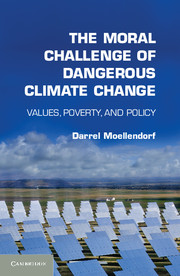Book contents
- Frontmatter
- Dedication
- Contents
- Acknowledgments
- Introduction
- 1 Danger, Poverty, and Human Dignity
- 2 The Value of Biodiversity
- 3 Risks, Uncertainties, and Precaution
- 4 Discounting the Future and the Morality in Climate Change Economics
- 5 The Right to Sustainable Development
- 6 Responsibility and Climate Change Policy
- 7 Urgency and Policy
- Afterword Frankenstorms
- Appendix A The Antipoverty Principle and the Non-Identity Problem
- Appendix B Climate Change and the Human Rights of Future Persons: Assessing Four Philosophical Challenges
- Appendix C The Right to Sustainable Development versus International Paretianism
- Appendix D Declaration on Climate Justice
- Bibliography
- Index
- References
Appendix A - The Antipoverty Principle and the Non-Identity Problem
Published online by Cambridge University Press: 05 June 2014
- Frontmatter
- Dedication
- Contents
- Acknowledgments
- Introduction
- 1 Danger, Poverty, and Human Dignity
- 2 The Value of Biodiversity
- 3 Risks, Uncertainties, and Precaution
- 4 Discounting the Future and the Morality in Climate Change Economics
- 5 The Right to Sustainable Development
- 6 Responsibility and Climate Change Policy
- 7 Urgency and Policy
- Afterword Frankenstorms
- Appendix A The Antipoverty Principle and the Non-Identity Problem
- Appendix B Climate Change and the Human Rights of Future Persons: Assessing Four Philosophical Challenges
- Appendix C The Right to Sustainable Development versus International Paretianism
- Appendix D Declaration on Climate Justice
- Bibliography
- Index
- References
Summary
Derek Parfit sees a problem for moral theories comprising principles he calls “The Person-Affecting View,” or simply V, which holds that “it is bad if people are affected for the worse.” He is using “worse” here as he uses “worse-off,” which he takes to refer “either to someone's level of happiness, or more narrowly to his standard of living, or more broadly, to the quality of his life.” To claim that a person is affected for the worse requires a comparison between the person's well-being as she is affected by the action and as she might have been without the action.
Changes in some institutional frameworks affect who will live in the future. As we adjust our energy policy, we will affect an array of major components of modern society from transportation to industrial production to recreation. These affect the circumstances in which people meet, have romantic encounters, and conceive children. The non-identity problem arises for theories such as V in these cases because they cannot account for what is wrong (when there is a wrong) in cases where policies affect who will be brought into existence. These policies do not render actual future persons worse-off because without such policies these persons would not have existed. We can call that the argument the no worse-off argument. The non-identity problem is sometimes misunderstood as a kind of skepticism about whether there can be anything wrong with actions in which the identity of persons is contingent on what we do. It is not that. Rather, it is a claim about the limitations of certain moral theories in accounting for what is wrong. It is, in other words, a problem for normative ethics, not applied ethics.
- Type
- Chapter
- Information
- The Moral Challenge of Dangerous Climate ChangeValues, Poverty, and Policy, pp. 213 - 219Publisher: Cambridge University PressPrint publication year: 2014

